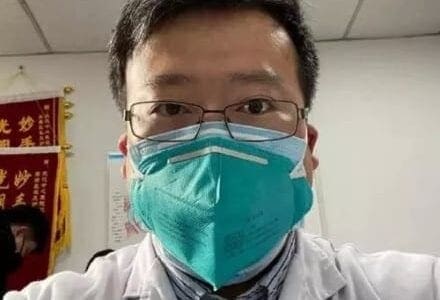Bioethics Forum Essay
Chinese Bioethicists: Silencing Doctor Impeded Early Control of Coronavirus
The death of Dr Li Wenliang from COVID-19 is heartbreaking for our country and people. Dr. Li was reprimanded for messages he posted in a chat group warning fellow doctors about a mysterious infection. His death on February 7 sparked anguish and anger because it underscored gaps and deficiencies in our country’s health care system and system of governance. As bioethicists, we think that it is a good time for our country to reflect on those deficiencies and consider reforms.
Dr. Li was an ophthalmologist working at a hospital affiliated with Wuhan University. On December 30, 2019, when the Wuhan Health Commission issued an urgent notice on the treatment of pneumonia with unknown causes, Dr. Li treated a patient with an eye disease who had symptoms that suggested pneumonia. About at 5 pm that day, he sent a WeChat message to a group of his school classmates saying that “7 cases of SARS have been confirmed who have been at South China Seafood and Fruits Market, and now are isolated at Emergency Department in the Post Lake Wards of our hospital.” He added, “The latest news is that coronavirus infection has been confirmed and virus typing is under way” and “Don’t spread the word outside our group. Let your family and loved ones take precautions.” A screenshot of the group chat was uploaded to a public website and spread. This is how Dr. Li became the epidemic’s whistle blower.
On January 3 Dr. Li was detained and questioned by the local police at the Wuhan Municipal Bureau for Public Security. The details of the conversation were not disclosed, but the result was a reprimand for an “unlawful act,” which is that he “made untrue remarks about 7 confirmed cases of SARS at South China Fruits and Seafood Market.”
The police then required Dr. Li to agree to two statements. The first one was: ”Public police agency hopes you will actively cooperate with our work, listen to the admonition made by civil police, and end your unlawful act. Can you do it?” Dr. Li answered, “Can.” The second statement was: “If you are unrepentant, and continue your unlawful act, you will be punished by law. Do you understand?” Dr. Li replied, “Understand.” Then he signed his name. Seven of Dr. Li’s classmates also signed the Form of Reprimand.
The Form of Reprimand did not specify which article in China’s constitution was violated by Dr. Li and his schoolmates. We searched the constitution and couldn’t find any article that applies. The police act to admonish them, therefore, was unethical and unlawful because it violated their freedom of expression, which is written in China’s constitution.
China’s constitution states that citizens have “freedom of speech” (Article 35). WeChat, the Chinese multipurpose messaging, social media, and mobile payment app with about 1 billion users in mainland China, enables Chinese citizens to enjoy the right of expression. However, this right is limited. Some limitations can be ethically justified. For instance, we just had a meeting with law experts to call the legislature to ban the videos that show abuse of pets. Other limitations on citizens’ speech include pornography; expression or images of violence; racial, gender, or other prejudices; and techniques for committing suicide or murder. However, it is not very clear what should be censored and what should not be censored. For example, cyber police usually use the reason of maintaining social stability to suppress individual right of expression. The police report on Dr. Li stated, “Your behavior severely disrupts social order.” But it is not clear which expressions undermine social stability.
Dr. Li’s group chat concerned a professional issue, how to control a possible epidemic. The content of the chat would have provided very important information to hospitals, public health officers, and China’s center for disease control for controlling the epidemic. In an interview with a journalist Dr. Li talked about his motivation for issuing his message: since most of his classmates were also clinicians, he want to remind them to take precautions.
After the admonition by police Dr. Li kept working in clinical practice and, unfortunately, became infected with the virus and died. Dr. Li is a martyr in the fight against the COVID-19 epidemic. The infringement on his right of expression is both unethical and unlawful, and it impeded early control of the epidemic. Now with the approval of the central government, the National Supervisory Commission, an agency that investigates unlawful acts of governmental officials and judiciary officers, has sent an investigation team to Wuhan to conduct a comprehensive investigation into the issues that the public has raised concerning Dr. Li. We wait for the results of their investigation.
Ruipeng Lei, a Hastings Center Fellow, is Professor and Executive Director Center for Bioethics Huazhong University of Science & Technology. Renzong Qiu, a Hastings Center Fellow, is Professor and Director, Institute of Bioethics, Center for Ethics & Moral Studies, Renmin University of China.
For additional information and ethics resources on the Coronavirus, please visit our Ethics Resources page:
https://www.thehastingscenter.org/ethics-resources-on-the-coronavirus/













I think Dr Li was a martyr whistleblower killed by the Covid-19 he tried to warn China about and through China the world. If Li had succeeded in getting authorities to quarantine sooner would they have been able to stop the spread beyond China’s borders? The 7 cases of confirmed SARS were they actually SARS or COVID-19? And in a quarantine should foreigners be kept or sent home to social distance themselves?
I am saddened by this story and for the Family.
Thank You Dr.Li for what you tried to do in warning people. You won’t be forgotten.
I appreciate Professor Lei and Professor Qiu’s essay. Certainly, the freedom of speech in any country is not unlimited. The grounds on which the Wuhan police threatened to prosecute Dr. Li Wenliang and consequently silenced him into submission were, however, unethical and unlawful. Dr. Li was trying to warn others that something of a catastrophic order might be looming. Certainly, he did not violate any moral and legal norms. Instead, the Wuhan police did not only people in Wuhan, but also people in the world now, a gigantic disservice because had Dr. Li been able to warn the Chinese people, would the world be facing a pandemic today? I hope the investigation mentioned by Professor Lei and Professor Qiu will be completed soon and made known to the public.